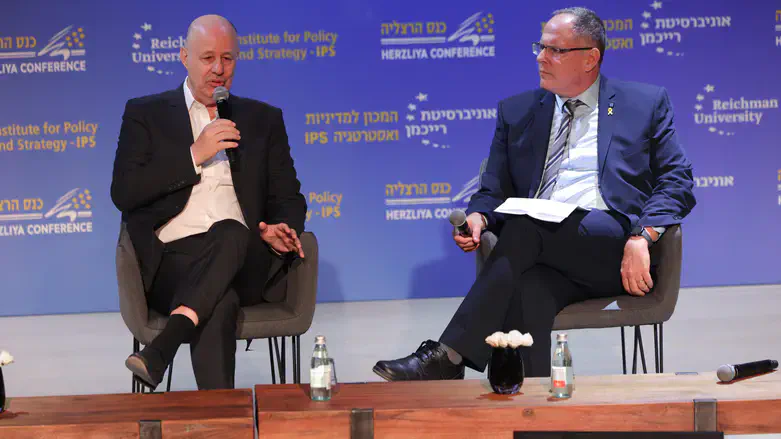
National Security Adviser Tzachi Hanegbi on Tuesday spoke at the Herzliya Conference convened by the Institute for Policy and Strategy (IPS) at Reichman University about the war against Hamas in Gaza.
According to Hanegbi, "Hamas cannot be eliminated completely because it is an idea."
"The policy was indeed determined by the war cabinet and the government, establishing goals for the war in Gaza," he explained. "There are three goals, and there is no ranking or prioritization among them. There is certainly urgency and priority to the issue of the return of the hostages, but it is not that there is one goal that is more sacred or important than the others. Of course, returning the hostages is most urgent."
"The three goals are bringing back the hostages that are alive and those that are not, restoring security to the residents of the Gaza Envelope in the sense that there will be no threat from Gaza, and the destruction of the military and governmental capabilities of Hamas. There is an outline, an Israeli outline that President Biden and the Security Council have adopted, one which was defined by the Secretary of State as a 'very generous' Israeli proposal.
"The State of Israel has nothing to do with the government or the prime minister. The country is in one of its most difficult and demanding periods — and you can ask who is to blame, and I believe there will be answers from authorized sources."
He added, "I deal with the issue of national security from morning to night with the best people in Israel —the IDF Chief of Staff, the heads of the Shin Bet and the Mossad, and people in the security establishment who are engaged every day in achieving the three goals of the war. People are falling in this war so that the hostages may return home. We must bring back every one of the remaining 120 hostages. Our commitment is to bring everyone home, and for this purpose people are giving their lives. We are with the division commanders and see the combat soldiers inside Gaza as well, and it is amazing and wonderful to see the commitment to bring them home. Let's leave the debates for the day after and ensure that there are no more massacres like there was on October 7."
"I strongly agree that time is not on the hostages’ side. I am more optimistic than what you suggest, because I think that the international pressure on Hamas may have an impact, including by powers that often align themselves against the West. There is enormous pressure on Qatar to accept the offer as is. We have the impression that the US commitment to the deal is 100 percent. We need to stand firmly behind the proposal because it will start the comprehensive process of returning all the hostages."
Regarding the governmental alternative to Hamas, Hanegbi said: "Certainly, once Hamas’s ability to lead the regime is dismantled, there will be more opportunities for countries that want to see a governmental alternative to mobilize. The cabinet authorized the IDF to lead the process of finding a governmental alternative. In recent weeks, the IDF has honed a plan that will begin to be implemented in the northern Gaza Strip."
"We believe in it and think it will exert enormous pressure on Hamas. Hamas cannot be eliminated completely because it is an idea, and therefore an alternative idea is needed, and the alternative idea is a local leadership that can live alongside Israel and not invest in trying to kill Israelis. Any Israeli proposal will not materialize because anyone cooperating with it will lose legitimacy among the Palestinian public.
"The idea is that there will be a top-down process led by a coalition of moderate Arab countries together with the United States, Europe and the United Nations, with all parties having to take responsibility while leading the process of replacing Hamas. I don't know a single moderate Arab country that wants Hamas to survive; they want to see a moderate and pragmatic alternative to Hamas in Gaza. Those who will have to lead this process are a moderate Palestinian leadership with the backing of the moderate Arab countries."
On the question of Lebanon, Hanegbi said: "The objective is known to everyone. In order to return the residents to their homes, a different reality is required on the Israel-Lebanon border. The Americans are taking the lead on this with Amos Hochstein, who was also in Israel last week. He will return to the region and is optimistic. He believes that after the operation in Rafah, Hezbollah will have a ladder to climb down from and it will be possible to talk about a resolution to the situation in the north. If there is no resolution by diplomatic means, there will be a resolution by other means, but we are choosing to focus on the diplomatic campaign."

